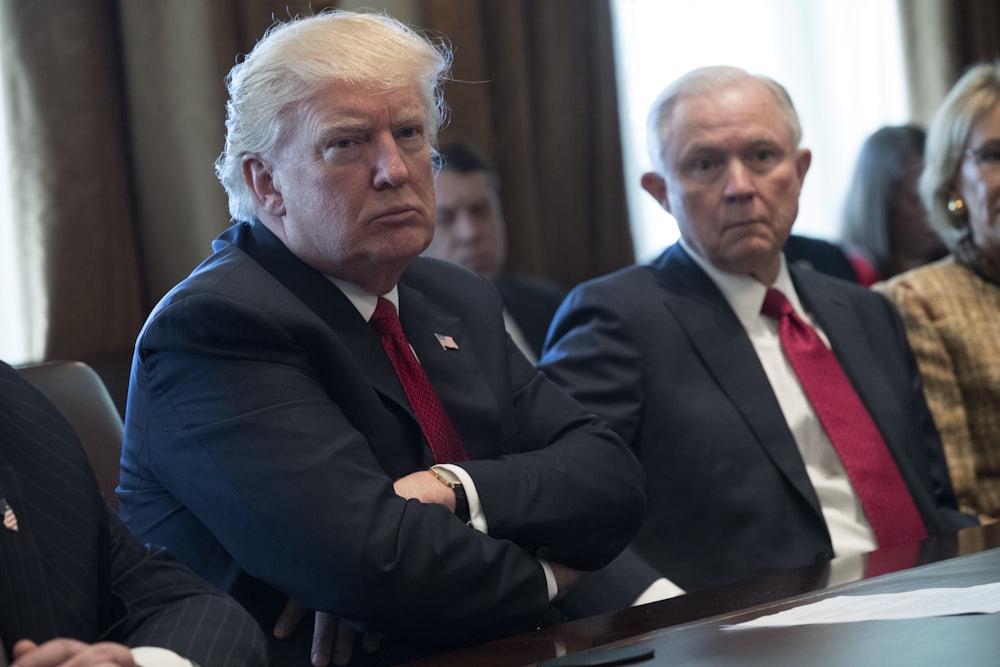Settling the fierce academic debate over whether or not a president can pardon himself would probably require a president to pardon himself for certain federal crimes and then, presumably after his term, challenge efforts to try him for those crimes, his self-pardon notwithstanding. The mere fact that the current president is putting the question to his lawyers, though, speaks volumes not just about his culpability, but about where his priorities lie.
The pardon power stems from the Constitution’s stipulation that the president “shall have Power to grant Reprieves and Pardons for Offenses against the United States, except in Cases of Impeachment.” While the legal question would turn on whether a “grant” can be directed inward or only outward, the act itself would concede to the commission of “offenses against the United States.” By pardoning himself, Trump wouldn’t be inoculating himself against political jeopardy, only attempting to keep himself out of prison.
A president who claimed to be a tribune for law and order is mulling ways to immunize himself from prosecution for crimes, while showing no comparable mercy to anyone outside his immediate family or circle of conspirators. The Justice Department’s investigation of Russian influence in the 2016 election—and of the Trump campaign’s assistance in those efforts—is exposing as a sham Trump’s claim to loyalty to anyone other than himself.
Trump’s famously ghoulish campaign trail boast that he “could stand in the middle of 5th Avenue and shoot somebody and [not] lose any voters” was a slight exaggeration, but it spoke to something true and profound. The GOP base’s indifference to Russian election interference, and to Trump’s complicity with it, shows the strength of the bond Trump forged with a certain segment of the electorate through his unconventionally nasty and dishonest style on the stump.
The point of Trump’s boast was that his support isn’t rooted in integrity or ethics or law but in mutual reciprocity. His loyalists will look past any number of ideological and ethical and even legal transgressions because they believe he is fighting to secure more important things, and that his survival will portend their revival. But Trump’s conduct in office, and in his efforts to obstruct the Russia investigation, give the lie to the implicit promise of his campaign.
Just a week ago, I argued that the investigation will provide Trump “many opportunities to let underlings take falls, and undermine ‘satellites’ who become political liabilities,” and that “he will take these opportunities every time.” The very next day, Trump ran down his own attorney general, Jeff Sessions, in a bizarre and incriminating interview with three New York Times reporters. Sessions was among the first major figures in Republican politics—and the first elected ethnonationalist right-winger—to endorse Trump. As Joshua Green’s new campaign tell-all Devil’s Bargain demonstrates convincingly, Sessions put his career on the line to help Trump win the Republican nomination. His reward was his dream job as America’s top law enforcement official. But now that Trump is casting about for scapegoats, he blames Sessions for his legal woes, tells the “Failing New York Times” that he regrets the appointment, and may even be trying to push Sessions out.
Two days later, Trump—dissatisfied by the persistence of the Russia scandal—layered over his committed but comically inept press secretary Sean Spicer, hiring slippery Wall Street veteran Anthony Scaramucci (a former Democrat and Trump critic) to be his communications director. Spicer promptly resigned.
Then on Sunday, Trump tweeted this.
It's very sad that Republicans, even some that were carried over the line on my back, do very little to protect their President.
— Donald J. Trump (@realDonaldTrump) July 23, 2017
Trump didn’t specify which Republicans he had in mind or what constitutes their disloyalty, but the word “protect” connotes some clear jeopardy to Trump, rather than his political preference that certain legislation pass. Republicans in Congress have largely sought to insulate Trump from consequences for his corruption, but some have exhorted him not to fire DOJ special counsel Robert Mueller, and one GOP senator—Richard Burr of North Carolina—is leading the Intelligence Committee’s Trump-Russia investigation after winning a tough re-election fight eight months ago.
The president’s disloyalty to his political allies will come as no surprise to people who’ve done business with Trump over the years, or who received a settlement from him after attending his scam “university.” The Carrier employees who believed he’d saved their jobs during the transition are awakening to his opportunism, too. But the vast majority of Trump loyalists have just made their first bargain with him, and the bargain wasn’t expressly economic, but political. The indications that he will cut his political allies loose en masse when they become inconvenient to him are only becoming clear for the first time now.
